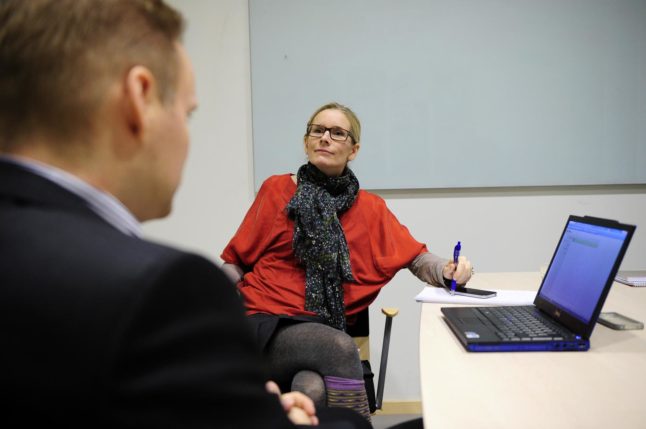Migration Minister Maria Malmer Stenergard and Employment Minister Johan Pehrson at a press conference announced a new supplementary directive, which they said would better limit low-skilled labour migration to Sweden while at the same time promoting highly-skilled labour.
They appeared at the press conference alongside Sweden Democrat migration spokesperson Ludvig Asplind.
An end to Labour Market Testing
The supplementary directive amends the investigation into reforming work permit rules which was launched by the former Social Democrat government, ordering the investigation’s leader, judge Ann-Jeanette Eriksson, to stop looking at labour market testing and instead focus her inquiry on a number of different policies designed in line with the government and the Sweden Democrats’ Tidö coalition agreement.
Labour market testing is a system under which businesses and unions agree on a list of jobs where there is a shortage in Sweden.
The government argues that limiting low-skilled migration to Sweden from outside the EU will in turn promote highly-skilled labour migration by lowering the number of work permit applications and thereby cutting waiting times.
Delay to implementing salary threshold
The new directive also appears to delay the introduction of a higher minimum salary threshold for work permits until at least 2024.
It tasks the inquiry with deciding the level of the salary threshold approved by parliament in November 2022, asking it to propose “a certain salary level for work permits to be granted”.
Under the November bill, the minimum salary was to come into force on “the day the government decides”, with the government itself empowered to set the exact salary level through a directive issued on the day the new rules come into force.
In November, Malmer Stenergard said that the government intended to bring in the new minimum salary “as soon as possible”.
The inquiry has been given an extended deadline of January 1st, 2024, which suggests that the salary threshold will in fact not come into force until after this date.
Transitional period
Malmer Stenergard confirmed to The Local that work permit applicants renewing their permits will be given a transitional period once the salary requirement comes into effect, although first-time applicants will need to fulfil the requirements in place at the point at which they apply.
“The rules in place when you send in your application are the ones which apply,” she said. “For extension permits, there will be a transitional period of 12 months where the old rules apply if you already held a work permit.”
This means, in practice, that those who hold a Swedish work permit under the current rules or those who apply for a permit before the new rules come into effect will not need to fulfil the salary threshold requirement until January 1st, 2025 at the earliest.
Some professions exempt from salary threshold
Some professions may also not be subject to this salary threshold, Employment Minister Johan Pehrson said, although he would not specify which professions this might include, adding that this would be decided by the inquiry.
“We’re looking at the possibility of completely excluding some groups,” he said. “In that case, it would include the competencies, experience and skills Sweden needs.”
In addition to this, the government wants to make it impossible for work permits to be granted for some professions, such as personal assistants, which it has identified as professions where there is a high level of fraud or abuse of the work permit system.
The new directive also states that work permit applicants who are granted a permit for less than a year, meaning that they cannot be registered in Sweden’s population register and are as a result not eligible for Swedish healthcare, would also need to take out comprehensive health insurance to cover them during this period.
New organisation focusing on highly skilled labour migrants
When The Local asked how the government planned to make Sweden more attractive to highly-qualified workers, Migration Minister Maria Malmer Stenergard said that “there is a lot we need to do”.
“I’ve tasked the Migration Agency with promoting highly-qualified labour migration, which has led to them working on a proposal for a completely new organisation which will focus solely on recruitment of international labour,” she said.
“This, I believe in itself will lead to a much faster processing time, clearer communication and better contact with Swedish authorities, which is one piece of the puzzle in making Sweden more attractive.”
Malmer Stenergard also confirmed to The Local in a separate interview that this organisation will be a completely different department at the Migration Agency with its own staff, that will not, for instance, be affected by other tasks carried out by the agency, such the identification of work permit holders who are misusing their permits, or the issuing of citizenship applications.



 Please whitelist us to continue reading.
Please whitelist us to continue reading.
Member comments